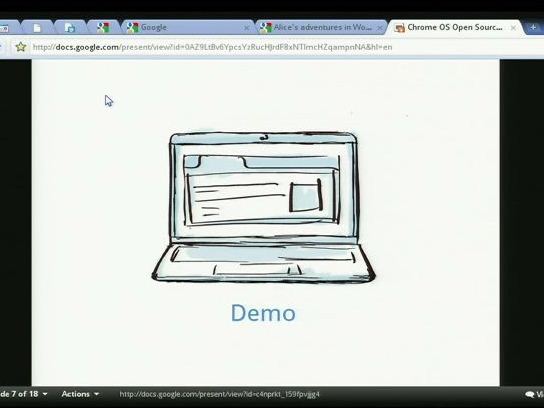
Google has shown off its Chrome OS operating system for the first time, with the internet giant 'open sourcing' the code for its latest venture, and billing it as the ideal OS for a complimentary device rather than a main computer.
Showing off an early build of Chrome OS for the first time, Google's press conference confirmed that much of what you would expect from a Google product is present and accounted for, with the phrase "Speed, simplicity and security" used throughout the presentation.
The OS is pretty much a browser with much greater functionality rather than a traditional OS, and will only work with solid state memory rather than a hard drive.
Reference devices
Interestingly, Google talked about producing 'reference' devices - suggesting that it wants larger laptops with full-sized keyboards and bigger screens, but was not prepared to give a potential price point, merely that it was working with partners on an official spec.
All applications are web apps - and everything is stored in the cloud, online, with the local memory used "only as a cache and accelerator".
Google stated that it expects Chrome OS devices will be a secondary device rather than a primary device, indicating that it does not expect Chrome to support more complicated programs, but act as complimentary to a main machine.
Sign up for breaking news, reviews, opinion, top tech deals, and more.
"As a consumer, you can't go download Chrome OS," said Sundar Pichai, Vice President of Product Management. "You will have to go and buy a Chrome OS device."
Chrome IS Chrome OS
Pichai also pointed out that Chrome was both the browser and the OS, meaning that other browsers could not run - although the open source nature of the code does feasibly mean that other browser makers could develop their own operating systems.
"Chrome IS Chrome OS," Pichai opened the conference by saying.
There will be offline access, although Chrome OS is obviously designed for a constant connection, and HTML 5 is key to the entire venture.
A whole new world
Announced back in July, Google's first foray into the world of the operating system has inevitably attracted huge amounts of interest both from the media and the general public.
Although, Google stated that it was looking to launch on netbooks at the end of 2010, it is clear that the internet giant could challenge Microsoft on laptops and PCs should it show its worth in the low-cost, small form-factor market.
Microsoft has been overjoyed with the reaction to Windows 7 since it launched in late October and will feel confident that its latest OS can defend against all-comers, but Google has both the financial might and popularity to potentially produce something that is adopted by the public.
But Chrome OS is a seismic change from what people are expecting; and Google's assertion that this is meant to be for secondary devices means that this is not meant to replace Windows - at least not yet.

Patrick Goss is the ex-Editor in Chief of TechRadar. Patrick was a passionate and experienced journalist, and he has been lucky enough to work on some of the finest online properties on the planet, building audiences everywhere and establishing himself at the forefront of digital content. After a long stint as the boss at TechRadar, Patrick has now moved on to a role with Apple, where he is the Managing Editor for the App Store in the UK.